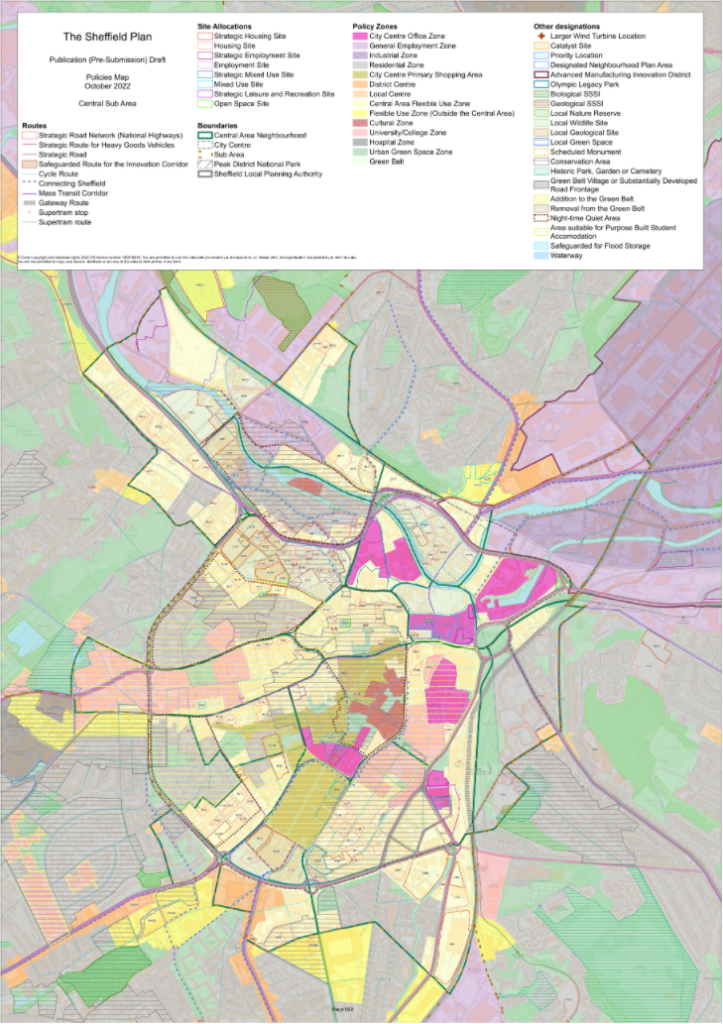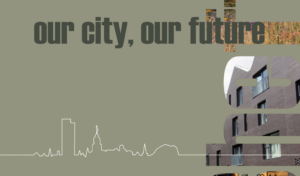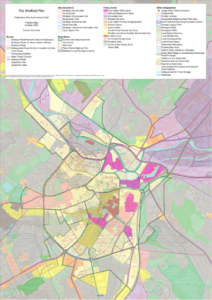The Sheffield Plan provides an almost unique opportunity to consider...
Read MoreWhat's New
South Yorkshire Climate Alliance's response to the draft Sheffield Plan
SCA has made formal representations to Sheffield City Council on the draft Sheffield Plan. There is much to be welcomed in the plan, particularly in relation to developing 20-minute neighbourhoods, and in responding to the biodiversity crisis.
However, we believe that the plan is unsound because the level of ambition is incompatible with the Council’s own policy of achieving net zero carbon emissions by 2030. The plan should set higher environmental standards and be a major driver of reducing carbon emissions and building a resilient city.
The Positives
We welcome the recognition that future growth will have detrimental impacts on air quality, climate, health and journey times unless travel is managed and sustainable access and movement are prioritised over car-based travel.
The focus on encouraging active travel, developing ’20-minute neighbourhoods, and reducing car dependence is welcome. The importance of being able to walk, cycle or use public transport to meet daily needs is rightly stressed. We welcome the emphasis on the potential of rail, and the mention of E-cargo bikes and consolidation hubs for the more sustainable transportation of freight. The delivery of the Midland Mainline Electrification Programme, not least for the resultant improvements in air quality. Improvements to east-west rail connectivity are vital.
The recognition of the need to protect, manage and enhance the blue and green infrastructure of the city, so as to increase biodiversity and combat climate change, is welcomed, as are the policies that set out how this will be protected and enhanced as part of new development.

The Negatives
Although the climate emergency is mentioned throughout the plan, there is no evidence that the policies proposed will enable the Council’s target of net zero emissions by 2030 to be met. Their soundness is thus in question. We believe the plan could and should go further.
New developments will not be required to be net zero until after 1 January 2030. We argue that the Environmentally Sustainable City policies should therefore be more ambitious.
Through local plans, local authorities can set higher standards for carbon reduction in new developments than government policy currently requires. The operational and embodied carbon emissions over the course of a building’s lifetime could be greatly reduced if near passivhaus standards were adopted from the outset. Minimal heating costs and healthier living conditions would be assured for initial and subsequent occupants without the need for expensive modifications. Failing to do so will create an immediate and costly retrofit burden for future owners or the public purse.
SCC has argued that viability constrains the scope for doing this but considerable site-by-site variation is noted in the Whole Plan Viability Assessment (VA) on which these assumptions are based. Elsewhere SCC has reasoned that the VA under-states the amount of development value that can be captured for affordable housing and set more ambitious policies accordingly. In keeping with best practice across other local authorities, we argue Policy ES1 should be amended to require net zero carbon in new dwellings and non-residential developments from 2025 rather than 2030. As with affordable housing contributions, this shifts the burden of proof onto developers to seek exemptions on sites where viability constrains future-proofed development.
In addition, Policy ES1 should relate to all development, not just that resulting in new residential units or new non-residential buildings. The very many planning applications that deal with house extensions should not be allowed to proceed if they would then increase the building’s emissions.
SCA also objects to the policy on the extraction of fossil fuels. If Sheffield is aiming to become net-zero by 2030, there should be no further exploitation of fossil fuels. The plan should state that proposals must be able to demonstrate that the proposed scheme will have a net zero impact on climate change.
SCA also questions the need to deliver improved trans-Pennine road links, as these would encourage more traffic across the Peak District.
We have suggested additional wording in the aims and objectives to emphasise the opportunities for (and necessity of) emissions reduction in all areas, including the economy, transport, and city design. The paragraph on the growth plan and spatial strategy should include specific mention of the need for a growth plan that leads to a reduction in emissions. It talks of sustainable growth, but does not define this.
Download our full response
Our full response to the draft Sheffield Plan was submitted online, in the form of 40 separate submissions on the specific parts and policies of the Plan. We have combined these into a single document, which is available to download here. You can download the full text of our representations here:
Related posts:
Draft Sheffield Plan open for consultation from 9 January
On Wednesday 14 December the Sheffield City Council is expected...
Read More

